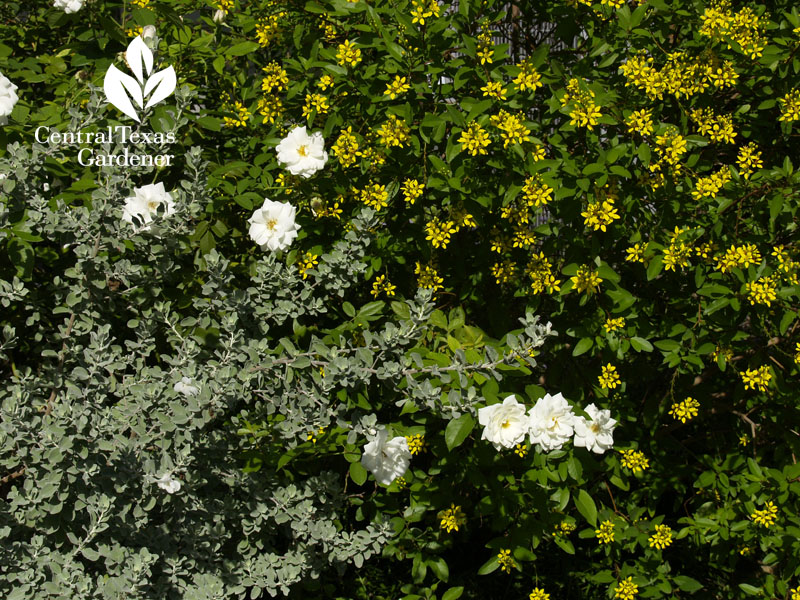October 25, 2012
Px3: Perennial, Pollinators, Powerful
I absolutely fall for fall, when everything explodes at once! A few white-blooming ‘Silverado’ cenizo (Texas sage) flowers hooked up with re-blooming Iceberg roses and hot weather thryallis.

White mistflower (Ageratina havanensis) will pop us a few flowers in spring, but it goes for the gusto as the days get shorter and cooler, attracting migrating and residential butterflies, moths, and hummingbirds.

Daphne makes this native perennial her pick of the week. This wildlife favorite can grow as tall as 6’ but usually I’ve seen it in the 2-3’ foot range. Late winter shearing will encourage shrubbier growth and more flowers, since it blooms on new wood. The ones I planted last fall are now among my favorites! This one’s in the front bed with Yucca ‘Margaritaville,’ pink skullcap, purple heart, daylilies, bamboo muhly and soon to bloom Copper Canyon daisy.

I include plants for pollinators in every season, since one of the top secrets to a healthy garden is abundant wildlife. Plus, you’ll be “on tour” every day to a thankful crowd!
To show off a few, Crystal Murray from Far South Nursery joins Tom this week.

Far South is a wholesale nursery, so don’t show up at their doorstep! Instead, ask for these plants at your nursery, since they supply many in Texas. But, do check out their great plant list for details about some of the tried and true plants they grow.
A new one to me is Indian mallow (Abutilon palmeri), with silvery velvety leaves on a plant that can get 5’ tall. It wants full sun and good drainage. Since it’s only hardy to 25°, it may be a re-seeding annual in cold winters.

Another for sunny dry spots is native Gray golden-aster (Heterotheca canescens) that gets about 1’ tall to attract small butterflies from July to September.

Whoa, check this out: a pink-blooming Anisacanthus (Anisacanthus puberulus).

Unlike the orange flame acanthus beloved by hummingbirds in late summer/fall, this one blooms in spring, with a more arching habit, attracting hummingbirds, butterflies and moths.
A little one I relish in spring is native blue-eyed grass (many species). This member of the iris family actually showed up in my desert-like yard long ago. As soon as I amended the soil, off if went. Now, I’ve got a return every year with transplants in the sunny cat cove, where I’ve dug in a few bags of decomposed granite, assuring good drainage.

A perennial evergreen groundcover that doesn’t like much water and well-drained soil is groundcover creeping germander (Teucrium cossonii). I planted my first ones this year to cover the ground under The Fairy roses (set back by drought, but quickly returning).

This well-drained curbside bed gets the west afternoon sun, reflected street heat, and minimal water.

Someday, mine are going to look like these at Shoal Creek Nursery.

When I stopped by Shoal Creek last week, they were starting to bloom. I bet the bees are all over them by now!

Crystal also promotes Barbados cherry (Malpighia glabra). Blooming and fruiting from spring to frost, these drought-tough shrubs/small trees are evergreen except in extremely cold winters.

That’s just the quick version! Watch online for all of Crystal’s plants and explanations and get her list.
On tour in Kyle, see how Ida Bujan reduced her lawn thumbprint and turned her small garden into a native habitat.

She’s got the most glorious Barbados cherry ever!

Crystal recommends native frogfruit (Phyla nodiflora). I love how Ida replaced lawn with this white-flowering, evergreen groundcover on this side slope.

See how Ida did it!
Herbs also attract many beneficial insects. Right now is prime time to plant cool weather yummies for us, like cilantro, parsley, dill and fennel. This week, Trisha shows what she’s planting and how to divide crowded nursery transplants for even more to flavor your recipes.

Certainly, you’ll want extras of parsley, fennel, and dill to attract swallowtail butterflies to lay their eggs. A few caterpillars eating your plants late next spring mean lots of butterflies all over the place!
It’s also the best time to plant trees, shrubs and perennials. But what’s the best way to water them? Daphne answers Mary Riley’s great question: Do I water my shrubs to the drip line, like for trees? Find out how.
Thanks for stopping by! See you next week, Linda
tags:

